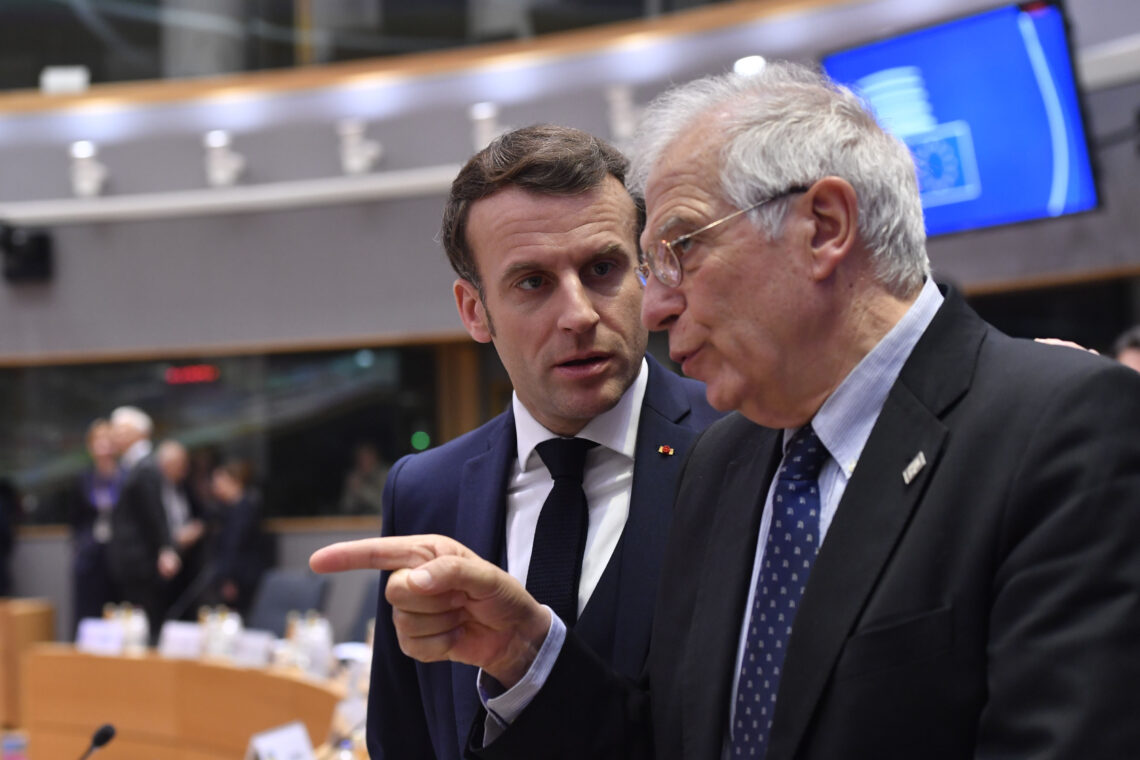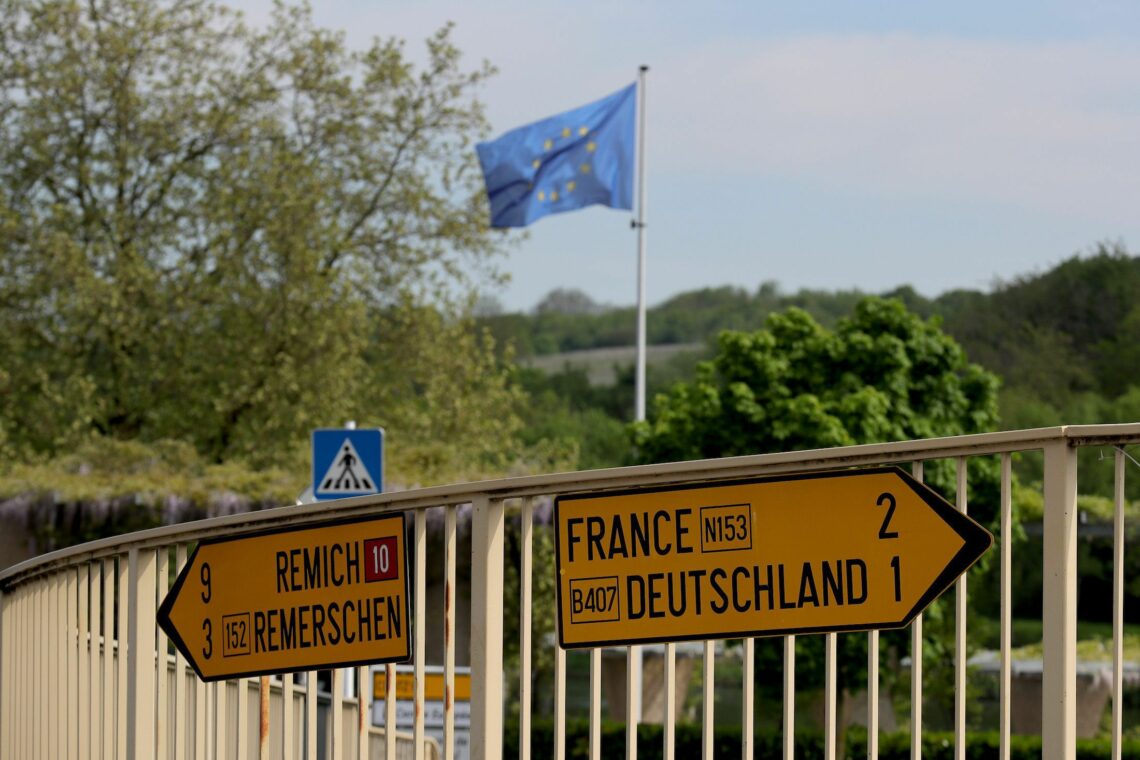The EU: A geopolitical or geo-economic power?
The most effective course for the European Union to achieve “great power” status is to extend the continent’s geo-economic weight. The EU was never meant to be a major foreign policy player, and remains an essentially civilian organization.

In a nutshell
- The EU was not intended as a major security power
- Structural limitations will prevent much foreign policy action
- Trade and other economic issues are its best play for influence
Europeans seem to want the European Union to become a “great power,” but it is far from clear what that would mean in practical terms or how it might be achieved. This report suggests that the most effective course would be the consolidation and extension of Europe’s geo-economic weight. According to a recent opinion survey, a plurality of Europeans with views on foreign policy would like to see the EU as a “beacon of democracy and human rights and one of the world’s great powers capable of defending itself.”
This desire for a more robust, values-based European foreign policy reflects suspicions of China and Russia, along with concerns about the reliability of the United States as an ally, even if those are partly allayed by President Joe Biden’s arrival in the White House. Opinion polls must be taken with a grain of salt and shed little light on how to overcome the many difficulties surrounding EU leaders’ making common policy choices and communicating them clearly and simply.
Political scientists often draw a distinction between “high” politics, involving mainly security questions, and “low” politics that concern economic and regulatory questions. But today this looks like a false dichotomy. The vast majority of transactions between international actors may be “technical,” but they inevitably carry political implications. The EU’s international influence depends on technical mastery of complex politico-economic issues. It also needs the political will and capabilities to implement decisions.
The EU is well equipped to deliver tangible benefits to European citizens in trade, market competition, health and safety, environmental protection and on other regulatory issues. There has been a modest increase in the number of Europeans believing that the EU will support them following the Covid-19 pandemic and the EU’s (initially shaky) joint vaccination purchasing scheme.
Skeptics view strategic autonomy as camouflage for protectionism.
The pandemic, economic recession and international tensions – as well as sporadic terrorist and cyberattacks – have led to calls, particularly from France, for the EU to be more proactive and less dependent on others. French President Emmanuel Macron is leading a drive for “strategic autonomy” and “a Europe that protects,” covering areas from defense to trade and digital regulation.
Such concepts informed the EU’s 2016 global strategy as well as current efforts toward a “strategic compass” meant to boost the EU’s crisis-management capabilities. But skeptics view strategic autonomy as camouflage for protectionism, and the public tires quickly of grand strategies unless they improve daily life.
Absent in crises
Despite these ambitions, the EU repeatedly runs into internal divisions when trying to limit conflict in its neighborhood. On its eastern and southern flanks, the EU has been largely absent from recent diplomatic and military crises. The wars in Syria, Libya, and Nagorno-Karabakh, as well as the outbursts of violence between Israel and Hamas, have not led to decisive action. In Gaza, the EU’s main role has been to provide humanitarian and reconstruction assistance, with projects often destroyed in the next round of fighting. Some ask whether decades of such assistance may not only have alleviated suffering but also prolonged the conflict.
The EU has been unable to tackle the ongoing crisis in Lebanon and the once-promising democratic transition in Tunisia. Migration sparked by the war in Syria occasioned a major internal EU crisis in 2015 and opened deep divisions among member countries. Covid-19 pushed migration down the EU’s priority list, but it is already returning as a major concern with the summer sailing season bringing more tragedies at sea.
As a tool to deal with security challenges, the EU has often turned to sanctions, along with political declarations, humanitarian and development assistance, police missions, and joint armaments projects. It also shares intelligence and plays a role in counterterrorism and combating cybercrime. This year the EU’s new Magnitsky Act was applied for the first time to freeze assets and ban visas of Russian officials involved in the imprisonment of opposition leader Alexei Navalny.
The EU’s generally cautious approach is explained by the fact that it is far more dependent than the U.S. on exports to China and Russia. The same goes for trade with Turkey, whose violations of “European sovereignty” in the Eastern Mediterranean led only to mild sanctions. Protocol slights to EU leaders in Ankara and Moscow were quickly brushed aside. The EU needs Turkey’s cooperation on trade, migration, energy transit and security, and has to consider the sensitivities of millions of EU residents of Turkish origin.

By contrast, Brussels moved quickly to impose flight restrictions on Belarus after the forced landing in Minsk of a Polish civilian aircraft flying between two EU capitals and the arrest of an opposition leader on board. It imposed further limited sanctions on Belarus mainly targeting individuals. At the same time, the U.S. and China are resorting increasingly to sanctions affecting EU citizens or enterprises. Such measures are a double-edged sword to be used cautiously – especially against countries powerful enough to impose their own restrictions on EU businesses and individuals.
According to a European Parliament study, “measures taken by the Trump administration against Cuba, Iran and Russia had an important extraterritorial dimension, which affects EU business and individuals and ultimately the sovereignty of the EU and its Member States.” In May, the European Parliament refused to ratify the EU-China Comprehensive Agreement on Investment (CAI) after Beijing imposed counter-sanctions on several European individuals and entities, including five of its members. French and German leaders indicated that the CAI would not be ratified until China took steps to ban forced labor. Sanctions are a tool rather than a policy, targeting public opinion as much as the ostensible troublemakers. They may sometimes produce effects but generally replace more effective but politically costly courses of action. There is a risk that sanctions become a reflex response rather than a means to a well-defined political end.
Security divisions
The EU’s reluctance to intervene, diplomatically or militarily, to stem conflict in its neighborhood has several causes: the preference of larger EU states for handling hot foreign policy issues themselves; national vetoes on foreign policy decisions; divergent national interests and threat perceptions; and overlapping membership in NATO, which is mainly responsible for primary defense. “Coalitions of the willing” offer a partial solution, but create new divisions among EU members.
Member states are divided on major geopolitical issues such as coordinating with a U.S. now governed by a “like-minded” president, or relations with Russia and China. Some EU countries view Russia as an existential threat, while others see it as a provider of energy security, a lucrative market, and an indispensable interlocutor. In June, these differences prevented France and Germany from gaining the European Council’s consent for fresh efforts at engagement with Russia. European countries took different sides during the civil war in Libya, involving cooperation with nondemocratic states.
Despite new structures and responsibilities, the EU remains an essentially civilian organization.
Brexit removed some obstacles to a common security and defense policy, but deprived the EU of Britain’s military assets and political influence as a permanent member of the United Nations Security Council. The present British government chose naval confrontation with Russia offshore of Crimea at the same time that France and Germany were advocating engagement with Moscow. When the dust from Brexit eventually settles, renewing cooperation across the English Channel would serve mutual interests. But this may take longer than expected given the present lack of mutual trust and confidence. Meanwhile, ad hoc foreign policy cooperation between Britain and European states may develop on a case-by-case bilateral basis, or in such settings as the informal E3 group of Britain, France and Germany.
Diplomatic limitations
The Lisbon Treaty equipped the EU with new structures to improve its performance as a foreign policy actor. It revamped the post of High Representative (HR) for Foreign Affairs and Security Policy, “double-hatted” as Vice-President (VP) of the European Commission. This was intended to allow the HR/VP to make full use of the Commission’s policy instruments in pursuing foreign policy goals. The High Representative, a role now filled by former Spanish foreign minister Josep Borrell, heads the European External Action Service (EEAS), a hybrid diplomatic service that replaced the Commission’s former external relations department. He is advised by a complex civilian-military administration.
In practice, however, it has proven difficult for the EU as such to speak and act with one voice on high-profile foreign policy issues, without the backing of influential member states. The HR/VP faces competition from the Commission and Council presidents, the six-month rotating presidency and national foreign ministers. Mr. Borrell and his predecessors have found it hard to cajole fellow commissioners into concerted action. The EEAS vies with Commission departments involved in external affairs and has yet to develop an esprit de corps among its staff of civil servants and temporarily detached national officials. More than a decade after it was set up, the EEAS’s performance is still uneven.
Geo-economics
In reality, the EU was never meant to be a major foreign and security player. Despite new structures and responsibilities, it remains an essentially civilian organization. Its influence springs mainly from the attractiveness of its model to candidates for membership and other neighboring countries, and from the outward projection of its internal policies and regulations.
These areas of influence are mainly geo-economic: trade, transport, financial assistance, technical regulation, environmental protection, climate policy, science, research, and, increasingly, public health. Since the fall of communism, European officials have tried, with mixed results, to leverage these public goods to obtain foreign commitments to “the values on which the EU is founded:” democracy, human rights and the rule-of-law. The euro and the Schengen travel area, generally free from internal border controls, are the kind of achievements that are hard to reproduce elsewhere.
The EU’s partners do not necessarily share its non-trade goals and may balk at their inclusion in bilateral agreements.
The scholar Anu Bradford has renamed the EU’s “normative power” as “the Brussels Effect,” a term that encapsulates an important dimension of the body’s geo-economic influence. It implies that the EU’s international influence comes mainly from governments and companies operating within its regulatory framework. The EU’s large internal market is seen as boosting its influence in a multipolar world ruled by competing models and growing tensions. But the subtitle of Bradford’s book – “How the European Union Rules the World” – is a considerable exaggeration.
There are limitations to the Brussels effect, despite the success of the EU’s data privacy legislation, its chemicals directive and other landmark norms and standards. Multinational companies are skilled at dividing the market to take advantage of distinct national rules. Trading partners, with their own priorities and government systems, are often reluctant to adopt European standards. Some see the EU as leaning unreasonably toward the precautionary principle, insisting on individual rights at the expense of business efficiency. China seems unlikely to accept EU standards in technological fields where its own firms are at the cutting edge of research and commercial development.
European trade
The European Commission’s recent trade policy review acknowledges that “the EU’s relative weight is shrinking given the emergence of new regulatory powers and rapid technological development, which is often driven from outside the EU.” Yet the review sees the EU’s regulatory leadership as providing “an important competitive advantage” and a “unique lever” to attaining its international goals. These include reinforcing multilateralism, notably by reforming the World Trade Organization (WTO) with U.S. support, and addressing such noncommercial policy objectives as sustainable development, fairer income distribution, environmental protection, human rights and labor standards. It also aims to tackle the digital divide, data privacy and prepare for future epidemics.
The EU is eager to dispel any impression that it seeks to use regulatory leverage for its own advantage.
The review underlines the value of the EU’s bilateral trade agreements in pursuing these goals and calls for increased assertiveness in defending European interests. But the EU’s partners do not necessarily share its non-trade goals and may balk at their inclusion in bilateral agreements. Even like-minded countries, like Canada, have been reluctant to accept provisions linking trade concessions to the fulfillment of human rights commitments. There is a risk that the proliferation of bilateral agreements could further weaken the WTO and other multilateral fora.
Open strategic economy
The EU is eager to dispel any impression that it seeks to use regulatory leverage for its own advantage. Innovations such as the mooted border carbon tax, which may make sense in internal political terms, expose the EU to charges of protectionism. This fits uneasily with the EU’s principled support for multilateralism.
As a result, the EU has taken to championing “open strategic autonomy,” implying that less dependence on global value chains would not impair openness to trade and investment. This approach combines assertiveness in defense of European interests with a renewed commitment to open and fair trade, dialogue and international cooperation. But the catchphrase is something of an oxymoron and it may not convince partners alert to their own needs and priorities.
Global influence
The EU-27 are unlikely to act consistently and powerfully on foreign policy as long as a single dissident government, calculating tactically to advance its particular concerns, can derail any proposed initiative. The EU is adept at finding workarounds and trade-offs, but this is not conducive to decision-making in crises. Members are unlikely to renounce their veto on sensitive political questions.
Despite legal and institutional innovations, foreign policy remains essentially intergovernmental, with the larger member states exerting most influence. Ad hoc coalitions of the willing allow groups of member states to act together under an EU umbrella. Most EU members belong to NATO, a politico-military alliance. Their continued attachment to NATO, despite doubts about U.S. commitments, was on display at the recent alliance summit in Brussels.
The self-designation of the current European Commission as “geopolitical” acknowledged the need for pragmatic, agile policies in a volatile world. But the EU’s major future challenge is how to master trade and technological interdependence for strategic purposes. This requires geo-economic capabilities, an area in which the EU has legal responsibilities, skills and experience. The EU is more likely to influence European citizens, trade partners and rivals by making the most of these comparative advantages than by pursuing great power ambitions.








